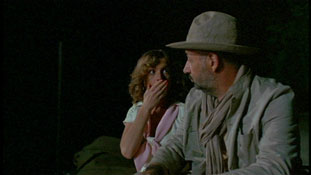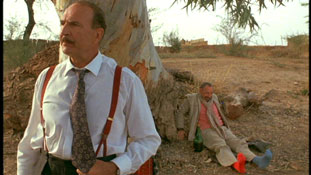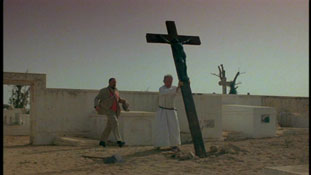Coup de Torchon
(Bertrand Tavernier) 1981
 Set in a small town (pop.
1280, and dwindling) in French controlled West Africa during the 1930ís,
Bertrand Tavernierís Coup de Torchon is a black-hearted farce that
follows Lucien (Philippe Noiret), a bumbling and corrupt police chief, as he
begins to redefine what justice is in a land thatís plagued by racism and
economic exploitation. The people of the town donít respect Lucienís
authority, since he can be bribed and never seems to arrest anyone in power,
despite their obvious crimes. In the first half hour of the film, Tavernier
paints Lucien as an utterly inept and corrupt fool. His wife blows off his sexual
advances (she seems more interested in her brother), the townsfolk practically
have to beg him to exert justice, and his fellow police officers have little
respect for him. Heís literally kicked to the ground four or five times in
these early scenes, and that makes him feel like more of a comic foil than he
eventually turns out to be. Thatís not to imply that the film isnít funny.
Itís often hilarious. Itís just that that humor is so mordant that itís
sometimes hard to accept. Even by the standards of other black comedies, this
film is shockingly savage at times, and one has to take pause before laughing at
it because itís packed with some offensive ideas.
Set in a small town (pop.
1280, and dwindling) in French controlled West Africa during the 1930ís,
Bertrand Tavernierís Coup de Torchon is a black-hearted farce that
follows Lucien (Philippe Noiret), a bumbling and corrupt police chief, as he
begins to redefine what justice is in a land thatís plagued by racism and
economic exploitation. The people of the town donít respect Lucienís
authority, since he can be bribed and never seems to arrest anyone in power,
despite their obvious crimes. In the first half hour of the film, Tavernier
paints Lucien as an utterly inept and corrupt fool. His wife blows off his sexual
advances (she seems more interested in her brother), the townsfolk practically
have to beg him to exert justice, and his fellow police officers have little
respect for him. Heís literally kicked to the ground four or five times in
these early scenes, and that makes him feel like more of a comic foil than he
eventually turns out to be. Thatís not to imply that the film isnít funny.
Itís often hilarious. Itís just that that humor is so mordant that itís
sometimes hard to accept. Even by the standards of other black comedies, this
film is shockingly savage at times, and one has to take pause before laughing at
it because itís packed with some offensive ideas.
 Because Tavernier wraps
Lucienís story up in belly laughs, his eventual downward slide is more
outrageous than it usually is in this sort of film. That it initially seems to
come out of nowhere (except perhaps his impotent sense of rage) makes it
infinitely more unsettling than it might have been otherwise. As the film
progresses though, and Lucien begins to spout justifications for his deeds, he
becomes harder to accept as a comic figure. When he says, ďAround here
youíve got to joke a little or youíll wind up shooting yourself,Ē you
worry that the film is endorsing the protagonistís response to the status quo.
He begins as a complete oaf, but we find that heís far more calculating than
we were led to think. Since heís the only authority in this climate ridden
with disease and death, the accumulation of a few more corpses hardly seems to
matter. Much of the humor comes about when he gets to take out his petty
frustrations out on people physically in the name of justice. Thereís a
chilling and unchecked portrait of unchecked rage here, but the film tries to
make it giddy instead of ghastly.
Because Tavernier wraps
Lucienís story up in belly laughs, his eventual downward slide is more
outrageous than it usually is in this sort of film. That it initially seems to
come out of nowhere (except perhaps his impotent sense of rage) makes it
infinitely more unsettling than it might have been otherwise. As the film
progresses though, and Lucien begins to spout justifications for his deeds, he
becomes harder to accept as a comic figure. When he says, ďAround here
youíve got to joke a little or youíll wind up shooting yourself,Ē you
worry that the film is endorsing the protagonistís response to the status quo.
He begins as a complete oaf, but we find that heís far more calculating than
we were led to think. Since heís the only authority in this climate ridden
with disease and death, the accumulation of a few more corpses hardly seems to
matter. Much of the humor comes about when he gets to take out his petty
frustrations out on people physically in the name of justice. Thereís a
chilling and unchecked portrait of unchecked rage here, but the film tries to
make it giddy instead of ghastly.
 Coup de Torchon is
disturbing, though, because itís quite apparent that Lucien is neither
ignorant nor totally immoral. In an earlier scene, he argues with a bigot that
black people have souls, but that doesnít stop him from dispatching anyone. He
sees himself as a righteous avenger who is justified by the hypocrisies of the
world. Though no one else places much stock in his position as a police officer,
he does, and takes the same logic that enables the law to such an extreme that
it becomes massively unjust and self-serving, much like the rationale that
allows the French settlers to exploit the African natives. He explicitly says at
one point, ďIím tired of taking the rap for doing what everyone wants to do
and doesnít have the courage to do themselves,Ē and the rationalization is
unsettling, because we realize that he only distorts and exaggerates the
impulses that already exist in society. Itís no wonder that he calls the town
his private paradise. Lucien is a fascinating and grotesque caricature of moral
logic run amok, and Noiret inhabits him with a sense of human need that makes
him scarily believable for most of Coup de Torchonís running time.
Itís only during the closing coda that the film stumbles in presenting him.
The last shot shows us a more ambiguous take on Lucien that suggests the
possibility of legitimate morality in this monster, but it feels like an utter
copout. Heís a creation that is larger than life, reality, or morality, and to
suggest otherwise flirts dangerously with endorsing his previous actions.
Coup de Torchon is
disturbing, though, because itís quite apparent that Lucien is neither
ignorant nor totally immoral. In an earlier scene, he argues with a bigot that
black people have souls, but that doesnít stop him from dispatching anyone. He
sees himself as a righteous avenger who is justified by the hypocrisies of the
world. Though no one else places much stock in his position as a police officer,
he does, and takes the same logic that enables the law to such an extreme that
it becomes massively unjust and self-serving, much like the rationale that
allows the French settlers to exploit the African natives. He explicitly says at
one point, ďIím tired of taking the rap for doing what everyone wants to do
and doesnít have the courage to do themselves,Ē and the rationalization is
unsettling, because we realize that he only distorts and exaggerates the
impulses that already exist in society. Itís no wonder that he calls the town
his private paradise. Lucien is a fascinating and grotesque caricature of moral
logic run amok, and Noiret inhabits him with a sense of human need that makes
him scarily believable for most of Coup de Torchonís running time.
Itís only during the closing coda that the film stumbles in presenting him.
The last shot shows us a more ambiguous take on Lucien that suggests the
possibility of legitimate morality in this monster, but it feels like an utter
copout. Heís a creation that is larger than life, reality, or morality, and to
suggest otherwise flirts dangerously with endorsing his previous actions.
* * * 1/2
07-16-02
Jeremy
Heilman